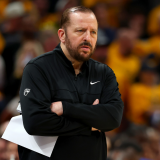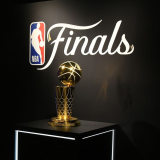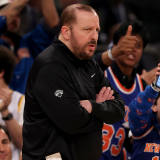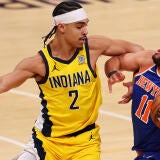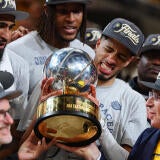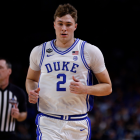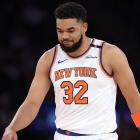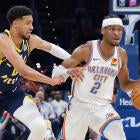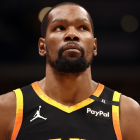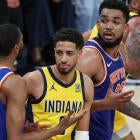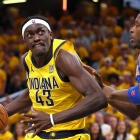
Broadly speaking, top prospects in the NBA Draft follow pretty similar arcs. Get drafted. Spend a few years on a rebuilding roster. Make the playoffs. Lose early a few times. Then start to compete for real around, say, the fifth or sixth year of their career. There's an obvious rhythm to all of this. The team is only in a position to draft that prospect because it was bad. It takes a few years to get good. Keeping a good team together is expensive and not really possible indefinitely in the current CBA environment. The idea is usually to time the team's rise with the beginning of the player's prime.
This is emphatically not the situation Cooper Flagg is about to walk into. If everything goes right, the Mavericks -- who improbably won the No. 1 pick in the 2025 NBA Draft on Monday night -- could genuinely contend for the 2026 championship. That's what they were planning to do when they traded Luka Dončić. Nico Harrison has said it time and time again. He thinks defense wins championships. The idea was to build a dominant defense around Anthony Davis. Flagg obviously helps them on that front.
The questions are longer term. Davis is 32. Irving is 33. Health was a major concern for both even before Irving tore his ACL. Realistically, their window to contend probably isn't more than another few seasons. Harrison hasn't committed to staying beyond the three years remaining on his contract. He had operated, before Monday, as if that was the only timeframe that mattered.
Now, obviously, it isn't. The Mavericks have at least five years of team-control on Flagg. Generally speaking, a team can safely assume it will keep a young star longer than that, at least until the end of their second contract after their eighth or ninth seasons. Build around them properly and you can get two decades. The Mavericks should know this well. They had it with Dirk Nowitzki. It certainly seemed like they would with Dončić as well. That's the hope for Flagg, but it's by no means a certainty.
These first few years? Potentially great. Afterward? That's murkier. Dallas does not control its first-round picks between 2027 and 2030. It has young talent. Dereck Lively is a starting-caliber center at the very least. Max Christie is a useful 3-and-D guard. But there's not an obvious path to replacing Davis and Irving when they age out of stardom without control of their own picks.
If someone else were running this team, there would be a straightforward solution to this: trade Davis. Who cares about the immediate title window? You have a decade now! Those 2026 championship odds, while not nonexistent, shrunk meaningfully when Irving tore his ACL. We don't know when he'll return. We don't know how productive he'll be upon his return. All we do know is that they're relying on a small guard to return from one of the most dangerous injuries in basketball right around his 33rd birthday and playing at a superstar level almost immediately. That doesn't seem especially likely. Dallas could go get a bundle for Davis now and do this the traditional way.
Harrison will never do it. He bet his reputation on Davis. He wants to win now. Someone who just traded a 25-year-old star for a 31-year-old doesn't seem especially likely to reconsider his approach for the sake of a teenager. For better or worse, the Mavericks are probably still prioritizing the present. What exactly does that mean?
They probably need to go get a guard somewhere. Brandon Williams was a nice two-way find last season, and Jaden Hardy still has upside, but they're not filling the Irving void. This is, fortunately, an unbalanced roster. There was a front-court logjam here even before Flagg. Lively and Daniel Gafford at center. Davis, presumably a full-time power forward now. P.J. Washington and Naji Marshall can play both forward slots. Klay Thompson needs to defend forwards at this point. Caleb Martin is here too.
The obvious play here would be to break up the center tandem. Gafford is a year away from free agency and reportedly wants starter money. Even if Davis is committed to playing power forward exclusively, you can find a viable replacement at backup center elsewhere. Gafford is their easiest ticket to a shot-creator that can tide them over until Irving comes back.
Finding a team that needs a non-shooting center isn't always easy, but the Mavericks created one at the deadline. Go pester the Lakers for all of the things they didn't give you in the Dončić trade. Take the Mark Williams package of Dalton Knecht and a bunch of future draft assets, shop it around the league, and see who can give you a decent guard for it. Ideally, it would be someone young enough to grow with Flagg. Anfernee Simons checks that box. Heck, maybe the Lakers would even think about Austin Reaves if Dallas put Lively on the table.
Is Harrison cold-blooded enough to shop Irving, should he opt into the final year of his deal? Probably not, given their Nike ties, but it would open a lot of doors when it comes to addressing the present vs. future dilemma. Trae Young is six-and-a-half years younger than Irving. He's on an expiring contract in Atlanta, and therefore has the leverage to force a trade if he wants one. Irving likely wouldn't hold much appeal to the Hawks or any younger team for that matter, but his expiring contract would, and the Mavericks still do have other trade chips to work with. The 2029 Lakers pick acquired in the Dončić deal, for instance, along with anything acquired in a possible center trade. Youth aside, there's real value in answering the health question early. Your immediate championship odds are better with a healthy point guard than an injured one.
In the likelier event that Irving extends, the length of his next contract, and Davis' for that matter, become critical. As it stands, Davis is set to expire in the summer of 2028. That would coincide with the final offseason of Flagg's rookie deal. Perhaps that's the built-in pivot here: keep Davis and Irving for three more seasons, then jettison them in time for max 2028 cap space. The pitfall there would be appeasing Davis. He'd surely want an extension before then. The Lakers, according to Yahoo's Vincent Goodwill, weren't planning to extend Davis in 2025 before trading him. That was probably prudent. How eager would you be to pay Davis for the season in which he'd turn 36?
These are questions that the the Mavericks now have to ask themselves even if Harrison won't. When he traded Dončić, he said that that "the future to me is three, four years from now." That might not even cover Flagg's rookie contract. The entire decision-making calculus in that building has to be different now. Flagg is the most important person in that organization now, and not just on the court. Off of it, he's their path to redemption with a fan base that almost completely turned on them. Harrison can try to win now. He can't mortgage Flagg's future to do it.
That's the balance the Mavericks need to strike here. They don't necessarily need to abandon Harrison's timeline, but they need to prioritize Flagg's. His arc is going to differ from a traditional top pick's, but starting out on a winner won't convince him to accept playing for a loser in five or six years.
![[object Object] Logo](https://sportshub.cbsistatic.com/i/2020/04/22/e9ceb731-8b3f-4c60-98fe-090ab66a2997/screen-shot-2020-04-22-at-11-04-56-am.png)




